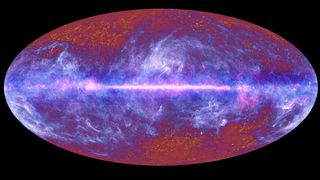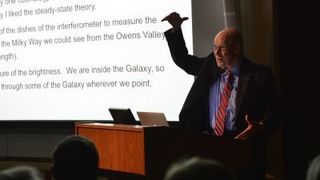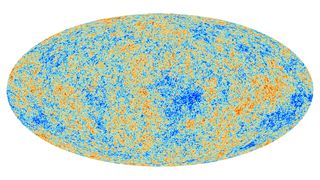What is the cosmic microwave background?
The cosmic microwave background can help scientists piece together the history of the universe.

The cosmic microwave background (CMB) is leftover radiation from the Big Bang or the time when the universe began. As the theory goes, when the universe was born it underwent rapid inflation, expansion and cooling. (The universe is still expanding today, and the expansion rate appears different depending on where you look). The CMB represents the heat leftover from the Big Bang.
You can't see the CMB with your naked eye, but it is everywhere in the universe. It is invisible to humans because it is so cold, just 2.725 degrees above absolute zero (minus 459.67 degrees Fahrenheit, or minus 273.15 degrees Celsius.) This means its radiation is most visible in the microwave part of the electromagnetic spectrum.
According to NASA, CMB fills the universe and in the days before cable TV every household with television could see the afterglow of the Big Bang. By turning the television to an "in-between" channel, you could see the CMB as a static signal on the screen.
Related: Some supermassive black holes may contain fingerprints from the Big Bang
How did the cosmic microwave background form?
The universe began 13.8 billion years ago, and the CMB dates back to about 400,000 years after the Big Bang. That's because in the early stages of the universe when it was just one-hundred-millionth the size it is today, its temperature was extreme: 273 million degrees above absolute zero, according to NASA.
Any atoms present at that time were quickly broken apart into small particles (protons and electrons). The radiation from the CMB in photons (particles representing quantums of light, or other radiation) was scattered off the electrons. "Thus, photons wandered through the early universe, just as optical light wanders through a dense fog," NASA wrote.
About 380,000 years after the Big Bang, the universe was cool enough that hydrogen could form. Because the CMB photons are barely affected by hitting hydrogen, the photons travel in straight lines. Cosmologists refer to a "surface of last scattering" when the CMB photons last hit matter; after that, the universe was too big. So when we map the CMB, we are looking back in time to 380,000 years after the Big Bang, just after the universe was opaque to radiation.

Who discovered the cosmic microwave background?
American cosmologist Ralph Apher first predicted the CMB in 1948, when he was doing work with Robert Herman and George Gamow, according to NASA. The team was doing research related to Big Bang nucleosynthesis, or the production of elements in the universe besides the lightest isotope (type) of hydrogen. This type of hydrogen was created very early in the universe's history.
But the CMB was first found by accident. In 1965, two researchers with Bell Telephone Laboratories (Arno Penzias and Robert Wilson) were creating a radio receiver and were puzzled by the noise it was picking up. They soon realized the noise came uniformly from all over the sky. At the same time, a team at Princeton University (led by Robert Dicke) was trying to find the CMB. Dicke's team got wind of the Bell experiment and realized the CMB had been found.
Both teams quickly published papers in the Astrophysical Journal in 1965, with Penzias and Wilson talking about what they saw, and Dicke's team explaining what it means in the context of the universe. (Later, Penzias and Wilson both received the 1978 Nobel Prize in physics).
What does the cosmic microwave background tell us?

The CMB is useful to scientists because it helps us learn how the early universe was formed. It is at a uniform temperature with only small fluctuations visible with precise telescopes. "By studying these fluctuations, cosmologists can learn about the origin of galaxies and large-scale structures of galaxies and they can measure the basic parameters of the Big Bang theory," NASA wrote.
While portions of the CMB were mapped in the ensuing decades after its discovery, the first space-based full-sky map came from NASA's Cosmic Background Explorer (COBE) mission, which launched in 1989 and ceased science operations in 1993. This "baby picture" of the universe, as NASA calls it, confirmed Big Bang theory predictions and also showed hints of cosmic structure that were not seen before. In 2006, the Nobel Prize in physics was awarded to COBE scientists John Mather at the NASA Goddard Space Flight Center, and George Smoot at the University of California, Berkeley.
A more detailed map came in 2003 courtesy of the Wilkinson Microwave Anisotropy Probe (WMAP), which launched in June 2001 and stopped collecting science data in 2010. The first picture pegged the universe's age at 13.7 billion years (a measurement since refined to 13.8 billion years) and also revealed a surprise: the oldest stars started shining about 200 million years after the Big Bang, far earlier than predicted.

Scientists followed up those results by studying the very early inflation stages of the universe (in the trillionth second after formation) and by giving more precise parameters on atom density, the universe's lumpiness and other properties of the universe shortly after it was formed. They also saw a strange asymmetry in average temperatures in both hemispheres of the sky, and a "cold spot" that was bigger than expected. The WMAP team received the 2018 Breakthrough Prize in Fundamental Physics for their work.
In 2013, data from the European Space Agency's Planck space telescope was released, showing the highest precision picture of the CMB yet. Scientists uncovered another mystery with this information: Fluctuations in the CMB at large angular scales did not match predictions. Planck also confirmed what WMAP saw in terms of the asymmetry and the cold spot. Planck's final data release in 2018 (the mission operated between 2009 and 2013) showed more proof that dark matter and dark energy — mysterious forces that are likely behind the acceleration of the universe — do seem to exist.
Other research efforts have attempted to look at different aspects of the CMB. One is determining types of polarization called E-modes (discovered by the Antarctica-based Degree Angular Scale Interferometer in 2002) and B-modes. B-modes can be produced from gravitational lensing of E-modes (this lensing was first seen by the South Pole Telescope in 2013) and gravitational waves (which were first observed in 2016 using the Advanced Laser Interferometer Gravitational Wave Observatory, or LIGO). In 2014, the Antarctic-based BICEP2 instrument was said to have found gravitational wave B-modes, but a further observation (including work from Planck) showed these results were due to cosmic dust.
As of mid-2018, scientists are still looking for the signal that showed a brief period of fast universe expansion shortly after the Big Bang. At that time, the universe was getting bigger at a rate faster than the speed of light. If this happened, researchers suspect this should be visible in the CMB through a form of polarization. A study that year suggested that a glow from nanodiamonds creates a faint, but discernible, light that interferes with cosmic observations. Now that this glow is accounted for, future investigations could remove it to better look for the faint polarization in the CMB, study authors said at the time.
Additional reading
If you would like to learn more about the cosmic microwave background and the Big Bang, check out this free course with the Open University. You can explore the strange "cold spot" in the cosmic microwave background in more detail with this article from Physics World and the UK Planck website lets you browse the maps of the sky created by the Planck space telescope.
Bibliography
- Ashtekar, Abhay, et al. "Alleviating the tension in the cosmic microwave background using Planck-scale physics." Physical review letters 125.5 (2020): 051302.
- Choi, Steve K., et al. "The Atacama Cosmology Telescope: a measurement of the Cosmic Microwave Background power spectra at 98 and 150 GHz." Journal of Cosmology and Astroparticle Physics 2020.12 (2020): 045.
- Pospelov, Maxim, et al. "Room for new physics in the Rayleigh-Jeans tail of the cosmic microwave background." Physical review letters 121.3 (2018): 031103.
Join our Space Forums to keep talking space on the latest missions, night sky and more! And if you have a news tip, correction or comment, let us know at: community@space.com.
Get the Space.com Newsletter
Breaking space news, the latest updates on rocket launches, skywatching events and more!

Elizabeth Howell (she/her), Ph.D., is a staff writer in the spaceflight channel since 2022 covering diversity, education and gaming as well. She was contributing writer for Space.com for 10 years before joining full-time. Elizabeth's reporting includes multiple exclusives with the White House and Office of the Vice-President of the United States, an exclusive conversation with aspiring space tourist (and NSYNC bassist) Lance Bass, speaking several times with the International Space Station, witnessing five human spaceflight launches on two continents, flying parabolic, working inside a spacesuit, and participating in a simulated Mars mission. Her latest book, "Why Am I Taller?", is co-written with astronaut Dave Williams. Elizabeth holds a Ph.D. and M.Sc. in Space Studies from the University of North Dakota, a Bachelor of Journalism from Canada's Carleton University and a Bachelor of History from Canada's Athabasca University. Elizabeth is also a post-secondary instructor in communications and science at several institutions since 2015; her experience includes developing and teaching an astronomy course at Canada's Algonquin College (with Indigenous content as well) to more than 1,000 students since 2020. Elizabeth first got interested in space after watching the movie Apollo 13 in 1996, and still wants to be an astronaut someday. Mastodon: https://qoto.org/@howellspace
